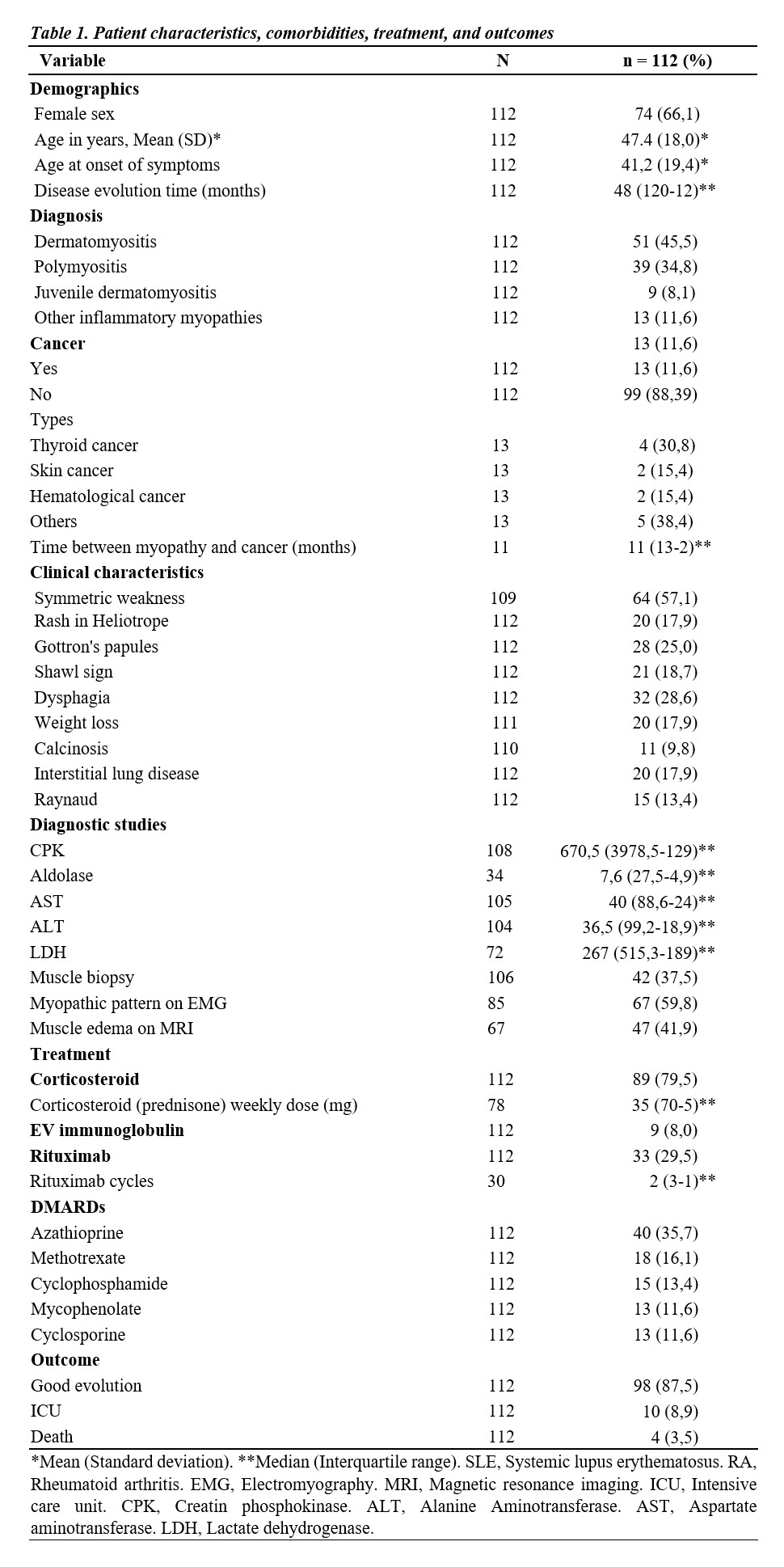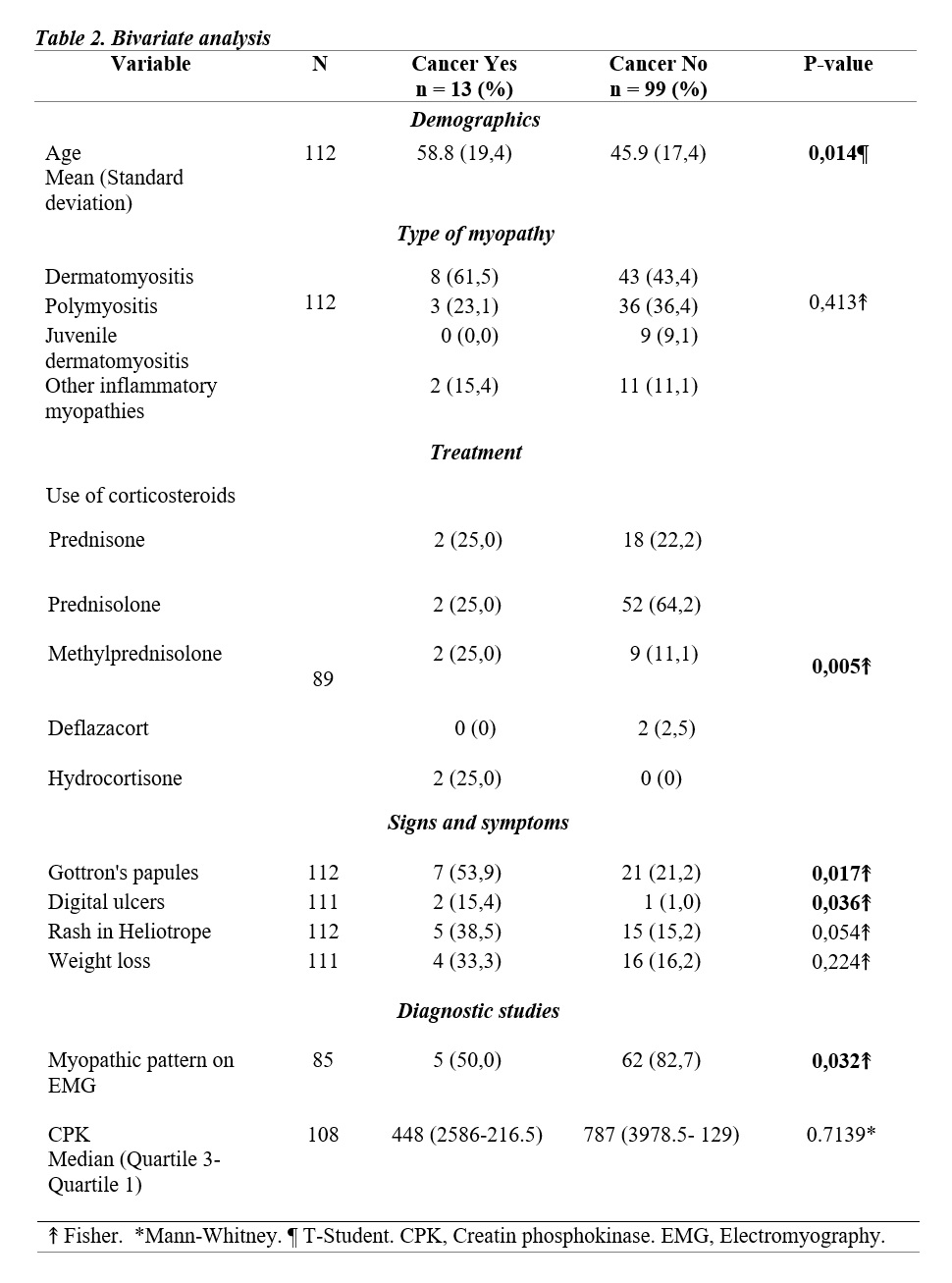Session Information
Date: Sunday, November 12, 2023
Title: (0283–0307) Muscle Biology, Myositis & Myopathies – Basic & Clinical Science Poster I
Session Type: Poster Session A
Session Time: 9:00AM-11:00AM
Background/Purpose: Inflammatory myopathies (IM) constitute a heterogeneous group of autoimmune muscle diseases. These can occur in isolation, associated with other autoimmune disorders, or as a development of some neoplasia. Different types of IM include dermatomyositis (DM) and polymyositis (PM). Magnetic resonance or electromyography can be helpful in the diagnosis, along with the performance of a biopsy. These entities have a higher risk of occult neoplasms, and cancer is one of the leading causes of death. Therefore, it is essential to understand the clinical, laboratory, and imaging characteristics in patients with IM associated with cancer. Our country’s information on this pathology and its association with cancer is limited. Therefore, generating new knowledge and broadening interest in research in this area is essential.
Methods: A descriptive, retrospective, cross-sectional study of a cohort of patients treated at Fundación Valle del Lili in Cali, Colombia, was performed between 2011 and 2022. All participants accomplished the American College of Rheumatology (ACR) criteria for adult inflammatory myopathies, and statistical analyzes were performed using Stata® version 14 (StataCorp, College Station, TX, USA). Quantitative variables were presented as means (standard deviation) or medians (interquartile range).
Results: A total of 112 patients from 2011 to 2022 were included. The patient’s median age at inclusion was 47,4 (± 18) years, with age at onset of symptoms of 41,2 (±19,4) years, being all females (100%). The primary inflammatory myopathies diagnosed were dermatomyositis 51 (45,5%), polymyositis 39 (34,8%), and juvenile dermatomyositis 9 (8,1%), which presented a disease evolution time of 48 (120-12) months. Some of the most prevalent clinical characteristics were symmetric weakness 64 (57%), upper limb weakness 63 (56%), myalgias 56 (50%), respiratory distress 31 (27,7%), arthralgia 46 (41%), and rash in Heliotrope 20 (17,9%). Additionally, 42 (37,5%) patients had muscle biopsy confirmation, and a myopathic pattern on EMG was evidenced in 67 (59,8%) individuals. 89 (79,5%) patients were treated with corticosteroids with a weekly dose of 35 (70-5) mg; other treatment included rituximab 33 (29,5%) with 2 (3-1) cycles approximately, azathioprine 40 (35,7%) and methotrexate 18 (16,1%). 13 (11,6%) patients were diagnosed with cancer; thyroid cancer was the most common 4 (30,8%). The time between myopathy and an oncologic diagnosis was 11 (13-2) months. A bivariate analysis was made evaluating the relationship among cancer and no cancer patients; some variables statistically significant were age (P < 0.01), use of corticosteroids (P < 0.05), Gottron´s papules (P < 0.017), digital ulcers (P < 0.036) and a myopathic pattern on EMG (P < 0.032). In this cohort, 4 (3.5%) patients died because of their underlying disease, and 98 (87.5%) presented a good evolution.
Conclusion: The characterization of patients with inflammatory myopathies and cancer in our country is essential due to its limited information, and it also opens the doors to generate new prospective studies that make it possible to create associations with a more significant statistical impact that guides early interventions in this type of patients.
To cite this abstract in AMA style:
Juan D. B, Robert R, Nieto-Aristizabal I, Enriquez K, Zura S, Echeverri A, Hormaza-Jaramillo A, Aguirre-Valencia D. Inflammatory Myopathies and Their Relationship with Cancer in a Colombian Cohort [abstract]. Arthritis Rheumatol. 2023; 75 (suppl 9). https://acrabstracts.org/abstract/inflammatory-myopathies-and-their-relationship-with-cancer-in-a-colombian-cohort/. Accessed .« Back to ACR Convergence 2023
ACR Meeting Abstracts - https://acrabstracts.org/abstract/inflammatory-myopathies-and-their-relationship-with-cancer-in-a-colombian-cohort/


